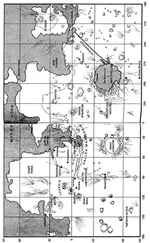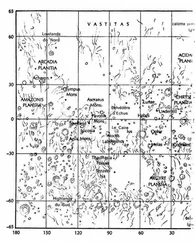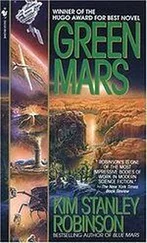But that was life in a revolution. No one was in control, no matter what people said. And for the most part it was better that way, especially here on Mars. Fighting had been severe in the first week, UNOMA and the transnationals had beefed up their security forces in the previous year. A lot of the big cities had been instantly seized by them, and it might have happened everywhere except that there turned out to be so many more rebel groups than they or anyone else had known about. Over sixty towns and stations had gotten on the net and declared independence, they had popped out of the labs and the hills and simply taken over. And now with Earth on the far side of the sun, and the nearest continuous shuttle destroyed, it was the security forces who were looking under siege, big cities or not.
A call came from the physical plant. They were having some trouble with the computers, and wanted Arkady to come have a look.
He left the city offices and walked across Menlo Park to the plant. It was just after sunrise, and most of Carr Crater was still in shadow. Only the west wall and the tall concrete buildings of the physical plant were in sunlight at this hour, their walls all yellow in the raw morning light, the pistes running up the crater wall like gold ribbons. In the shadowed streets the city was just waking. A lot of rebels had come in from other towns or the cratered highlands, and they slept on the park grass. People sat up, sleeping bags still draped over their legs, eyes puffy, hair wild. Night temperatures were being kept up, but it was still cool at dawn, and those out of their bags crouched around stoves, blowing into their hands and puttering with coffee pots and samovars, and checking to the west to see how close the line of sunlight had crept. When they saw Arkady they waved, and more than once he was stopped by people who wanted to get his opinion of the news, or give him advice. Arkady answered them all cheerfully. Again he felt that difference in the air, the sense that they were all in a new space together, everyone facing the same problems, everyone equal, everyone (seeing a heating coil glowing under a coffee pot) incandescent with the electricity of freedom.
He walked feeling lighter, chattering into his wristpad’s diary file as he went. “The park reminds me of what Orwell said about Barcelona in the hands of the anarchists— it is the euphoria of a new social contract, of a return to that child’s dream of fairness we all began with—”
His wristpad beeped and Phyllis’s face appeared on the tiny screen, which was annoying. “What do you want?” he asked.
“Nemesis is gone. We want you to surrender before any more damage is done. It’s simple now, Arkady. Surrender or die.”
He almost laughed. She was like the wicked witch in the Oz movie, appearing unexpectedly in his crystal ball.
“It’s no laughing matter!” she exclaimed. Suddenly he saw that she was scared.
“You know we had nothing to do with Nemesis,” he said. “It is irrelevant.”
“How can you be such a fool!” she cried.
“It is not foolishness. Listen, you tell your masters this— if they try to subdue the free cities here, we will destroy everything on Mars.” That was the Swiss defense.
“Do you think that matters?” She was white-lipped, her tiny image like a primitive fury mask.
“It matters. Look, Phyllis, I’m only the polar cap of this, there’s a massive underground lens that you can’t see. It’s really vast, and they’ve got the means to strike back at you if they want.”
She must have let her arm fall, because the image on his little screen swung wildly, then showed a floor. “You were always a fool,” her disembodied voice said. “Even back on the Ares.”
The connection went dead.
Arkady walked on, the city’s bustle no longer as exhilarating as it had been. If Phyllis were frightened. .
At the physical plant they were busy running a malfunction search. A couple of hours before, oxygen levels in the city had begun to rise, and no warning lights had gone off. A tech had discovered it accidentally.
Half an hour’s work and they found it. A program had been substituted. They replaced it, but Tati Anokhin was not happy. “Look, that had to be sabotage, and there’s still more oxygen than even this accounts for. Look, it’s nearly forty percent out there right now.”
“No wonder everyone is in such a good mood this morning.”
“I’m not. Besides that mood thing is a myth.”
“Are you sure? Go through the programming again, and look at the encryption IDs, and see if there are any other substitutions hidden under this one.”
He headed back to the city offices. He was halfway there when there was a loud pop overhead. He looked up and saw a small hole in the dome. The air suddenly took on an iridescent shimmer, as if they were inside a great soap bubble. A bright flash and a loud boom knocked him to his feet. Struggling back up, he saw everything ignite simultaneously; people were burning like torches; and right before his eyes his arm caught fire.
It was not hard to destroy Martian towns. No harder than breaking a window, or popping a balloon.
Nadia Cherneshevsky discovered this while holed up in the city offices of Lasswitz, a tent town which had been punctured one night just after sunset. All the surviving occupants were now huddled in the city offices or the physical plant. For three days they had spent their time going out to try to repair the tent, and watching TV to try and figure out what was going on. But the Terran news packages were concerned with its own wars, which seemed to be coalescing into one. Only infrequently was there a brief report on the wrecked Martian towns. One said that many domed craters had been hit by missiles from over the horizon, usually in a sequence where oxygen or aerated fuels were introduced and then quickly followed by an ignitor that caused explosions of varying severity— from antipersonnel fires, to blasts that blew the domes off, to really big explosions that in effect re-excavated the crater. Antipersonnel oxygen fires appeared to be the most common; these left the infrastructure intact, for the most part.
Tent towns were simpler still. Most of them had been punctured by Phobos-based lasers; some had had their physical plants targeted by guided cruise missiles; others had been invaded by troops of one kind or another, their spaceports seized, armored rovers crashing through city walls, and in rare cases rocketpack paratroopers descending from above.
Nadia watched the jiggling video images that so clearly revealed the fear of the camera operators, her stomach collapsing to a tight walnut inside her. “What are they doing, testing methods?” she cried.
“I doubt it,” said Yeli Zudov. “It’s probably just a matter of different groups using different methods. Some look like they’re trying to do as little damage as possible, others seem to want to kill as many of us as they can. Make more room for emigration.”
Nadia turned away, sickened. She got up and took off for the kitchen, bent slightly over her collapsed stomach, desperate to do something. In the kitchen they had turned on a generator and were microwaving frozen dinners. She helped hand them out, moving up and down a line of people sitting in the hall outside. Unwashed faces, splashed with black frostnip blisters: some people talked animatedly, others sat like statues, or slept leaning against each other. Most of them had been residents of Lasswitz, but a good number had driven in from tents or hideouts that had been destroyed from space, or attacked by ground forces. “Is stupid,” an old Arab woman was saying to a gnarled little man. “My parents were Red Crescent in Baghdad when the Americans bombed it, if they have the sky is nothing you can do, nothing! We have to surrender. Surrender as soon as possible!”
Читать дальше
Конец ознакомительного отрывка
Купить книгу












